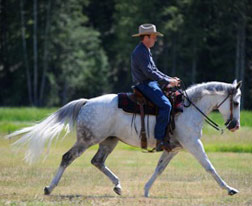
Q: My eight-year-old, affectionate Belgian/Canadian gelding that I have had for a year is nervous of noises, especially behind him, when we are riding.
I feel like I have almost gained complete trust from him, and I remain very calm and re-assuring with my body and voice but he still acts like there is a bear in the bushes. He is better with a group, but still jumpy.
I am 40, with two young children. I enjoy riding, but I need to stay alive. Can a Nervous Nelly ever gain enough confidence to be a Calm Cucumber? What else can I do?
A: I’m glad you asked about your situation, because it’s one that so many people face with horses. I’ll give you some ideas here, but first let me comment that horseback riding is supposed to be fun, and if you’re afraid or nervous, riding ceases to be enjoyable. More importantly, you need to be safe! It sort of tugged at my heartstrings when you mentioned your young children — which makes it even more imperative that you put safety as your number one priority.
Without seeing you and your horse, it’s difficult to give you a direct action plan that is exactly what you should do in that very moment when your horse reacts. Few of us have time to school a challenging horse every day in order to be safe, but I will suggest some ideas that may help. Ultimately, my thought is that you need a professional’s eye on you and your horse when he reacts. Getting a professional’s opinion about what’s best for both of you could provide a plan with optimum outcome.
Safety is obviously such a huge concern when dealing with horses. I noted that you think that controlling your horse can be attained by using a curb chain. Believe me, a curb chain won’t be the bandaid that holds everything together if it all goes really wrong! A curb chain will have little effect on a horse who’s blowing up. Here are some ideas, but again, please get a perspective from a professional who can watch you and your horse in person.
Many riders are faced with challenges similar to yours — whether their horses spook from noises behind them, from baby carriages, bikes, or even that same black stump that they have passed by 100 times! When a horse is spooky or reactive, the key is to maintain a high level of leadership and to have a focus or an intention in your body that lets him know that you have a plan in mind — with somewhere to go! It sounds like you have good control of your emotions and are able to stay calm when he reacts — and this is a great start. The circle response you’ve started — turning him in a circle when he acts up — is also a great idea.
So often a horse can ‘lead’ his rider by spooking or reacting to something. When that happens the rider focuses on what the horse is spooking at and tries to soothe the horse — and all the while the horse still remains focused on what was originally spooking him. In that moment, the ‘spook’ is in charge, and you need to take your leadership back! Ride away from whatever is spooking your horse, then ride back to it as close as possible without the horse reacting, ride away, come back again — you get the picture. Do this until the horse is ho-hum about the origin of the spook, and then keep riding down the trail.
I often think of my days working as a cowboy at the historic Quilchena Ranch in Merritt, British Columbia in Canada, and I remember that the times were few and far between when a horse spooked. That’s because we always had a job to do, and our horses didn’t have time or the inclination to spook! We were always going somewhere — we were riding our horses, not just going for a ride! Riding is an active thing, whether you are in the arena or out on the trail. Ride on the trail like you had to get somewhere, even if you are at a walk for the whole ride.
Horses are always looking for a leader, and by having this strong focus you can show your horse that he can relax under your leadership, and trust that you will keep him safe. You are doing well to ride him in circles when he reacts, giving him something else to focus on, and containing him in that circle. Try also riding back and forth past the area that he just spooked at, while asking something of him, whether it’s a concentrated circle, a hindquarter yield, a leg yield, or anything that will ask something of him mentally and physically.
And if your horse spooks at a dangerous spot on the trail, or if you think you’re in danger because of his spooking, get off! This is not something to be embarrassed about — it’s a safety issue. Getting off is sometimes the wisest thing you can do. Do what your intuition tells you to do — and if that’s to dismount, then do it!
So, the bottom line is to put your safety first (remember your two children!); the fun part of riding will then follow. Seek the opinion of a professional (possibly even lessons for you and your horse). Be your horse’s leader. Stay alert and direct your horse; keep your horse focused and his feet moving. You might even consider another horse that’s safe and dependable; there’s no disrespect in admitting that perhaps this horse isn’t quite the right match for you. I want you to enjoy riding and to be safe — for your sake and the sake of your children!
My May article in Horse Illustrated expands on this issue and concentrates on taking an anxious Arabian on his first trail ride. You might also want to view my video on here: “Setting Up for Success on the Trail with a Young Horse.”

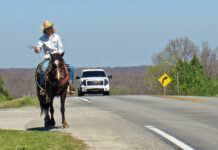
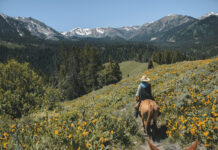
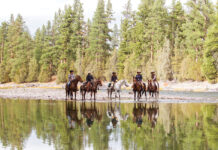

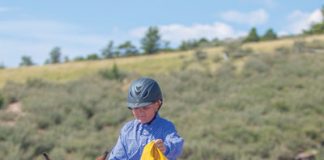
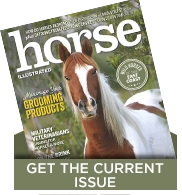
One thing that I have noticed with newer horse owners, (and some older ones too) is that they adopt a tone of worry in their voices when reassuring their horses.
Instead of saying, in a calm and firm tone, “get up there, and quit that” they say in a high pitched concerned tone, “it’s all right, don’t be scared” which does nothing to reassure the horse.
Same thing people do to babies for that matter.
If you constantly put a worry tone in your voice, then the horse feels there is something to worry about.
Not saying in this case that is going on, but it is something to consider.
After all, would you rather follow a confident leader into a battle, or one that is passing out the pacifiers and blankies?
I hope this article will help me, because I get nervous around cars when I am riding.
Great Article. It has helped me reading it.
since my trustworthy mount of 10 yrs passed away 2 years ago, i have been on a “finding the right horse” mission. the arabian i have now is the 3rd horse to be in the lineup and he’s been here for only 5 months. when i got him i was told he had tons of trail miles in the mountains. so i thought ok, he’s a pro, been there done that. nope. i could tell a big difference in him when we are near houses and when we are in the woods. calmer in the woods for sure, than around stuff. at this moment i have to ride on a single lane blacktop road to get to trails. that means passing cars, houses, dogs, mailboxes, trash containers, etc. the first ride i took him on after bringing him home, a dog came running up behind us on the trail, and he panicked and dumped me. (i was in a group) first time i’d hit the dirt in 8 yrs! ouch! the next 3 rides after that he almost dumped me each time freaking over anything that moved and made noise! just the wind blowing dead weeds made him panic. so, more ground work started. i now have a plastic grocery bag on a stick, that ive been desensitizing him with. he’s doing so much better with it now. i hung up a black garbage bag to flop and whip in the wind near his hay feeder. i now have 2 flags, 1 in my barn, 1 over the water trough outside. plus i took a clear plastic garbage bag and cut it into strips and hung it over the doorway, and if he wants in or out of the barn he has to go thru it, and he has. let me just say, what a world of difference those things have made!!! clinton anderson says, give your horse a heart attack every day! yes it looks crazy at my barn, but after all these noisy scary things have been around him on a daily basis he isnt as jumpy as he was. plus i just know our relationship is heading in the right direction now. up! i finally took him on a ride not to long ago, up the road, and onto the trail for over an hour! he was hesitant in a few spots, but nothing like he was before. he was more confident, and i was more confident. i really like this horse and think we can have a good future together. if he keeps his confidence and courage up, i have faith he will, we are going to make a great team!! good luck to you!
Thanks- I can use some of these tips when I do trail drives with my mini.
I loved all of your suggestions about a nervous horse. I would like to add one more that has worked wonders with my nervous gelding. I always had the sense that he wasn’t being disobedient but just got ‘stupid’ and quit thinking. His head got high and his neck was tense. After a spook he would do a bone jarring ‘jig’ for the remainder of the ride. I put him on a daily calming supplement and within a few weeks he started dropping his head and thinking through things that made him nervous (like a creek reflecting sunlight). He still spooks on occasion (what horse doesn’t) but they are milder and he calms back down quickly.